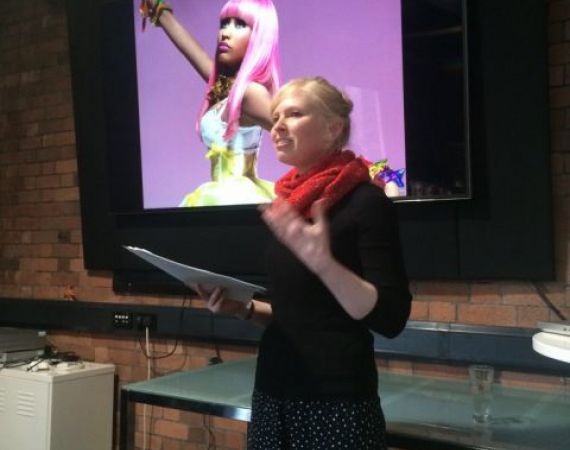Lunchtime talk write-up
Posted on Thu 17 Dec 2015
Pink Friday Fandom: Becoming Barbie with Nicki Minaj
Jennifer Whitney has recently joined us in the Studio as a Research Fellow with the Digital Cultures Research Centre, exploring ideas around ‘The Automation of Everyday Life.’

Jennifer Whitney
Speaker

Jennifer Whitney
Jennifer is a Postdoctoral Fellow for the DCRC’s research project ‘The Automation of Everyday Life’.Jennifer Whitney has recently joined us in the Studio as a Research Fellow with the Digital Cultures Research Centre, exploring ideas around ‘The Automation of Everyday Life.’ On Friday 27 November we invited her to share her thoughts on the phenomena that is Nicki Minaj, and her subversive, Barbie-esque super fans, 'the Barbz'.
Here are five things I learned:
1. American hip-hop artist Nicki Minaj has adopted a Barbie-like persona as an alter ego, and called her ‘Harajuku Barbie’. Minaj is changing what Barbie represents by combining hyper femininity with Japanese Harajuku culture; she calls it ‘kick-ass style’.
2. This playful appropriation of Barbie questions the assumptions of celebrity, identity and femininity. Minaj has criticized the music industry for the lack of longevity of female hip hop artists, who typically remain prominent within the industry for only 2.5 years which is vastly less than their male counterparts. Minaj seems to think that embracing the iconic Barbie image empowers her to stretch the limits of what is possible.
3. Minaj identifies that in many cultures there is an aspiration to be Barbie, but a scarcity of diverse Barbie doll options. There remains one iconic Barbie, who has white skin and blonde hair, and this image is reinforced by the fashion and cosmetics industry. There is a sense that identifying as Barbie is reserved for a select few, primarily white and blonde celebrities.
4. Minaj’s fans have started a movement of ‘Barbz’. Minaj encourages her fans to adopt their own Barbie-like persona, altering the icon and reinterpreting it in new ways for a diverse audience. The Barbz use social platforms to document and play with their Barbz status, primarily focusing on their image.
5. Minaj has almost retired her alter ego, but continues to encourage the Barbz to express their identity with confidence and creativity. She drives dialogue about racially inclusive feminism and inclusivity within the music industry.